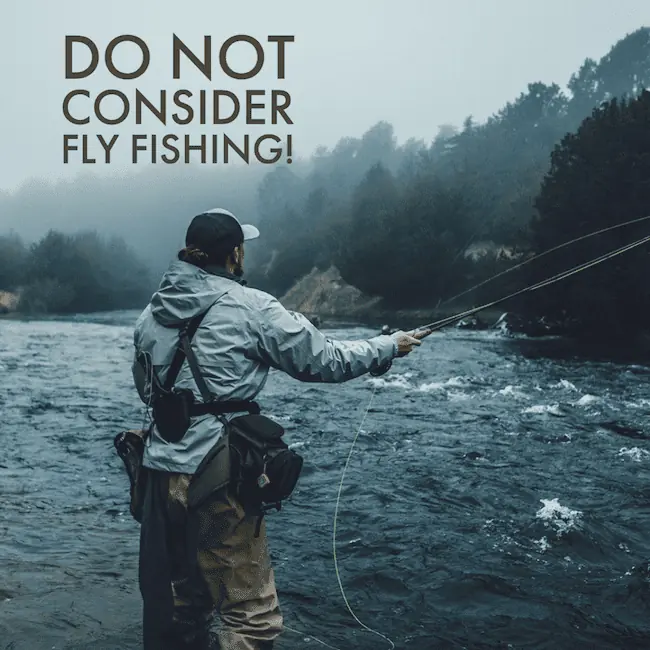For decades, fly fishing was considered a niche activity, popular primarily among older men with ample free time. However, it has recently gained popularity across the country.

Why You Should Avoid Fly Fishing
Today, women and younger individuals are increasingly taking up the sport. From my own experience, here’s why you should resist joining this trend. Here are four compelling reasons to stay away from fly fishing as a hobby.
Reason #1: From an Avid Angler: I Generally Dislike Fishing
I had little fishing experience in my youth, always considering it a dull waiting game. The excitement seemed to come only when a fish decided to take the bait. Meanwhile, much of the activity involved drinking and staring at a flat lake, which didn’t appeal to me as someone who enjoys being active.
About ten years ago, a hiking buddy suggested I try fly fishing. He claimed it combined the physical activity and outdoor enjoyment of hiking with the thrill of fishing, but with an added challenge. I was skeptical but signed up for a two-day course with a local fly fishing club to see what it was all about. By the middle of the class, I was hooked. Since then, I’ve been an avid fly fisher.
Okay, so my first reason to avoid fly fishing isn’t very convincing. But there are other reasons.
Reason #2: There Are Easier Ways to Fish
Fly fishing can be more challenging than traditional fishing. Even without considering the extreme conditions of ice fishing in Minnesota, the difference remains significant.
The essence of fly fishing is casting a nearly weightless fly onto the water in hopes of catching fish. In traditional fishing, the bait’s weight makes casting straightforward, allowing the angler to place it precisely where needed. In fly fishing, the line itself provides the necessary weight, requiring the angler to use the rod’s bend and the line’s motion to cast the fly accurately.
When done by a skilled fly fisher, the back-and-forth casting motion creates a beautiful loop of line. It’s also enjoyable and a skill that, while never fully mastered, can always be improved.
Reason #3: The Tangles and Knots
Critics of fly fishing argue that the sport can be frustrating. They have a point; fly fishers must master several knots with delicate materials known as tippets. During a day on the river, they may need to thread the tippet through the tiny “eyes” of the flies multiple times.
Flies are typically artificial imitations of insects, which are often quite small. When fly fishing for larger fish, such as in saltwater, the flies can imitate baitfish and be larger than insects but still require the same basic knots with fine lines.
With practice, fly fishers become adept at handling these knots and tiny flies. The initially frustrating aspects of the sport become part of the fun. Plus, they can chat with fellow anglers about flies with clever names like “Woolly Bugger” or “The Fly Formerly Known as Prince.”
Reason #4: There Are Easier Ways to Fish
Yes, there are simpler ways to fish, but where’s the fun in that? While the goal of fly fishing is to catch fish, the sport’s true enjoyment lies in the fishing itself. The stealth and skill required to catch a trout make fly fishing a combination of hunting and fishing.
Of course, catching a fish is thrilling. But the greatest satisfaction for me comes from watching a beautiful fish swim away after I release it. The second greatest is immersing myself in nature and appreciating its beauty.


